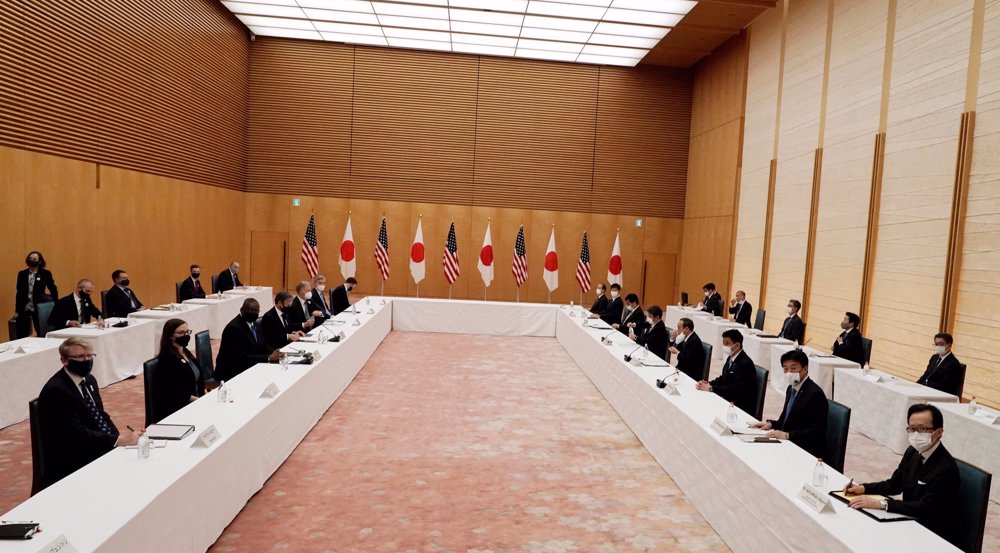US trumping up ‘coercion’ charge against China because own hegemony imperiled: Analyst
The United States is concoting and hyping up allegations of Chinese “coercion” merely because China is working to safeguard its sovereign interests in disregard of a global system that protects American hegemony, a political commentator says.
In an interview with Press TV on Wednesday, Dennis Etler, a former professor of anthropology at Cabrillo College in Aptos, California, said US President Joe Biden’s foreign policy officials have been saying in unison that there will be no reset to Sino-American relations until China stops its “coercive” behavior even though China itself has been the target of coercion by the US.
US Secretary of State Antony Blinken accused China of using “coercion and aggression” in the region during a visit to Japan on Tuesday, which took place in a bid to fortify Washington’s alliances in Asia.
NATO Secretary General Jens Stoltenberg has also recently said that the United States and the European Union (EU) must work together to counter what he has called Chinese bullying. British Prime Minister Boris Johnson has likewise raised concern about “China’s increasing power and international assertiveness.”
Etler said the hype was because China was working to protect its sovereign interests.
“Why all the clamor about China’s alleged coercion and bullying? It seems that the US and UK, along with its allies in NATO and East Asia, have very short memories. China had been coerced and bullied for a century by the Western powers and Japan before it threw off the yokes of colonialism and feudalism with the founding of the People’s Republic in 1949,” he said.
“Ever since, it has worked to safeguard and regain its legitimate sovereign rights that have been trampled upon by US imperialism,” Etler added.
In Tokyo, Blinken, US Defense Secretary Lloyd Austin, and their Japanese counterparts issued a statement saying that Beijing’s “behavior, where inconsistent with the existing international order, presents political, economic, military and technological challenges to the Alliance and to the international community.”
Etler said the so-called “rules-based international order” is the system of international coercion imposed by the United States after WWII and that its sole purpose is to ensure the continued existence of US global hegemony.
“Thus, when any nation asserts itself politically, economically, militarily, and/or technologically in a fashion contrary to US interests, it is attacked as threatening the ‘rules-based international order,’ [and engaging in] bullying and coercion,” he said.
“How ironic that a nation like China, that a decade ago was said to be on the verge of collapse and incapable of innovation, suddenly has become an existential threat to the most powerful nation that has ever existed! What magic has China wrought!” he said.
Etler said what has been described as China’s “coercive behavior” all relates to its internal affairs and core national interests.
“China’s policies in Hong Kong and Xinjiang are none of the concern of the US, UK, or NATO, just as their internal affairs are none of the concern of China. Are the racial divide, the continued genocide of Native Americans, and America’s flawed democracy China’s concern? Does China use those issues as factors in determining its relations with the US? Of course not! So why should the US raise China’s internal affairs when state-to-state relations are considered?” he said.
Blinken has criticized China for “eroding autonomy in Hong Kong and rights abuses in Xinjiang.”
Etler said the US would not be able to change China’s policy of protecting its interests.
“All the self-serving rhetoric of the US and its allies will have no effect on the Chinese. They will not change their policies no matter how stridently the US inveighs against them. But, the US is in no position to force China’s hand. Its economy is in shambles, it’s deeply in debt, with a dysfunctional Congress. The only thing holding the fractured US political system together is the bipartisan animus towards China, which serves as a convenient scapegoat for all of America’s ills,” he said.
Speaking to a roundtable of Japanese journalists in Tokyo on Wednesday, Blinken also said China was “raising tensions, not diminishing them,” in the region with its maritime actions and posturing toward Taiwan.
He said Beijing was “acting both more repressively at home and more aggressively abroad.”
Blinken’s comments come ahead of meetings in Alaska on Thursday that will bring together for the first time senior Biden administration officials and their Chinese counterparts to discuss frayed ties between the world’s top two economies.
“We look forward to the opportunity to lay out in very clear terms to our Chinese counterparts some of the concerns that we have about the actions they’re taking,” Blinken said.
Ties between Washington and Beijing particularly soured under former US president Donald Trump, who clashed with China on trade, technology, and regional security, among other things.
Biden has described China as Washington’s “most serious competitor,” saying the US would continue to confront what he has called China’s “attack on human rights, intellectual property and global governance.”
Beijing has rejected those charges and repeatedly said that the US must stop interfering in its internal affairs.
American warplane downed after Yemeni attacks 'baffled' US air defense: Ansarullah
VIDEO | Yemenis praise the military for its successful operations against Israel
VIDEO | Israel continues to bomb Gaza homes
VIDEO | An insider's view of the country: Meybod City in Yazd
‘All wars have rules. All of those rules have been broken’ by Israel
VIDEO | Report flags India’s violation of rights of Rohingya detainees
Turkey's foreign minister meets Syria's de facto leader in Damascus
VIDEO | US Syria plots












 This makes it easy to access the Press TV website
This makes it easy to access the Press TV website